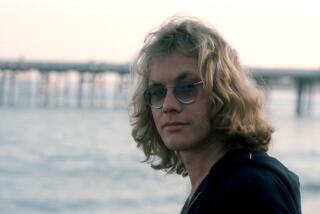He’s Dean of Gospel : Arts: Dave Weston is being honored for 50 years as a composer and arranger of religious music. Recognition has come from UCLA, Gov. Wilson and President Bush.
- Share via
SANTA MONICA — Religious music comes easily to Dave Weston--and well it should after 50 years. Last month, Weston, 69, celebrated his golden anniversary in gospel music at a dinner reception hosted by friends and family.
“We have a saying in our group that we’re trying to give him his flowers while he can still smell them,” said Clyde Smith, 46, a member of the Dave Weston Singers for 32 years.
Recognition of Weston is coming from other quarters as well, including California Gov. Pete Wilson and President and Mrs. Bush, who have praised his work.
And the Ethnomusicology Department at UCLA--Weston’s alma mater--recently recognized him as a pioneer and leader in black religious music. The department copied his compositions and recordings and gave them a permanent place in the university’s archives.
What makes Weston an innovator in this area is his rich, eclectic approach to gospel music, which embraces such diverse sounds as secular and classical music. “People of color have for years taken hymns out of hymn books and stylized them,” Smith said. Weston continues and broadens that tradition.
The spirit of Weston’s work is evident when he offers to sing his “The Christian’s Testimony,” a song that was a favorite of gospel great Mahalia Jackson. He zips over to the Steinway in his Santa Monica living room with the speed of someone half his age. As his fingers dance across the keys, he begins to sing: “Down here I’m talked about, lied upon, deceived a lot, even shunned, but I’m willing, oh so willing, my cross to bear. . . . “
Weston began writing his unique brand of gospel music in 1952. He estimates that he has written or arranged 40 songs and made 20 recordings. He has directed numerous choirs, and he even did a brief stint as a movie dancer, appearing in “Broadway Rhythm” and “Stormy Weather” with Lena Horne and Bill Robinson.
His older sister, Weltha, brought his short-lived career as a dancer to an end. “I didn’t bring you out here to hoof it up,” he says she told him.
Weston, who had come here from Lufkin, Tex., followed his sister’s original plan, getting his degree at UCLA.
He graduated with honors in 1947 with a major in English and a minor in music. In those days, he recalls, “you could walk over campus. Now you have to ride.”
After graduation, Weston embarked on a teaching career at then all-white Inglewood High School. Although his eighth-grade English students loved him, some of the coaches didn’t. His crime? He flunked two star football players, says Weston, recalling how the school’s principal interceded on his behalf. Weston ultimately left teaching because of instances of racial bigotry, such as having a white teacher get up and move from the table when he sat down in the teachers cafeteria.
Weston still won’t watch TV shows from that painful period in the American past. “I don’t even want to think about those days because I lived through them,” he says. “It seems like a bad dream now.”
After six months at Inglewood, he quit and began making music for a living. It was in Santa Monica that Weston found the racial diversity Inglewood had lacked.
Music students of all colors--blacks, whites and Latinos--flocked to his Santa Monica home for private piano and singing lessons at night. During the day, he taught adult music classes at Jefferson High School.
He still spends part of his time passing on his love of music to a steady stream of private piano students who come to his home. In November, Weston returned to his alma mater as a guest speaker in one of UCLA’s musicology classes.
*
He still makes music with the Dave Weston Singers, which he founded in 1949. Over the years, the group has traveled across the country and is now planning a European tour.
Even as a child, Weston could pick out any tune he heard played on the piano. “My ear was just that good.” He recalls that most people didn’t know he lacked formal training in music until one afternoon at a church tea when he was asked to accompany a featured singer on a song called “Indian Love Call.”
To the singer’s dismay, Weston started playing the only thing he knew by heart: a boogie.
Weston’s repertory has expanded considerably since then, but in his view, the key to gospel or any other kind of music is still the ear. Says the Westside’s dean of gospel: “It’s everything.”
More to Read
The biggest entertainment stories
Get our big stories about Hollywood, film, television, music, arts, culture and more right in your inbox as soon as they publish.
You may occasionally receive promotional content from the Los Angeles Times.










